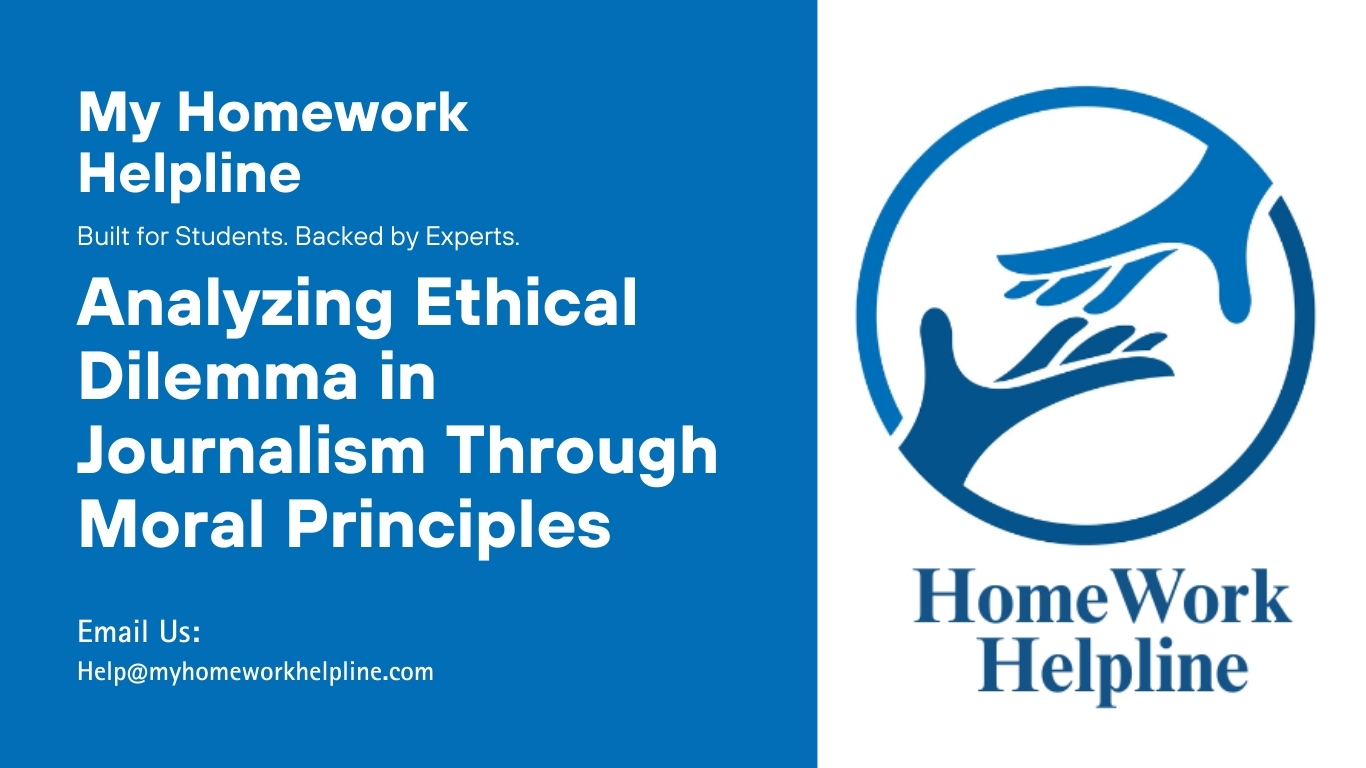Ethical Dilemma in Journalism Essay: Applying Mill, Kant & Aristotle’s Principles
As the reporter for the local newspaper in my town, I have to report the case of sexual assault by Ron Smith, who is running for sheriff in the coming elections. Even though the victim approached me seeking help, an ethical dilemma arose when my boss asked me to hold off publishing the article until after the polls were tallied. In my opinion, the best course of action in this scenario would be to thoroughly investigate and verify the allegations, balance public interest and privacy, consider the timing implications and consult professional advice. Ethical principles provide a framework for decision-making and help individuals navigate complex ethical issues like this dilemma. Of the three ethical principles, John Stuart Mill’s utility would be the most appropriate approach to the moral dilemma. Mill’s principle emphasizes the importance of maximizing happiness and minimizing harm for the most significant number of people. He believed that actions should promote the greatest good for the most important number of people (Ajvazi, 2022). Therefore, the principle of utility could be used to evaluate the morality of actions and policies and determine the best course of action for dilemmas. In this scenario, publishing the article about the sexual assault allegations could bring vital information for the public to make informed decisions in the election. Therefore, it would benefit the majority of the population.
Need help untangling complex academic writing tasks like this? At My Homework Helpline, we specialize in guiding students through challenging assignments with expert law homework assistance and support in research, essays, and case studies. Whether you’re handling law, philosophy, or ethics, our team ensures well-structured and plagiarism-free papers that boost your grades. Let us make your workload easier today.
Immanuel Kant’s principle, which focuses on duty and rules, would not be the most appropriate approach in this scenario because it does not consider the potential harm to the victim and the importance of bringing the truth to light. According to Kant, individuals have a moral duty and obligation to follow universal law like the categorical imperative. This concept states that one should only take actions that could become a universal law without causing contradictions. This implies that moral duty should exceed and transcend personal desires, interests and outcomes like pleasure, happiness or personal gain (Steinberg, 2020). Kant’s responsibility principle does not apply in this scenario because it strongly emphasizes rules and duties. Still, it may not provide clear guidance in this scenario of conflicting decisions. Reporting the truth is my duty as a journalist, but I have to consider the consequences of my actions since it is uncomfortable or unpopular, especially to the victim. For this reason, I do not believe that Kant’s principle is the most appropriate in this ethical dilemma.
For several reasons, Aristotle’s principle of virtue was not applicable in this scenario and even in the 21st century. To begin with, Aristotle’s focus on virtue is based on the notion that moral behaviour is a habit developed over time through repeated actions. However, today’s fast-paced and complex society is characterized by ethical dilemmas arising quickly and requiring immediate action. In addition, it is based on the ultimate goal of attaining fulfilment and happiness, which may not be the only relevant factor in the ethical dilemma (Papouli, 2019). As a reporter, balance ethical considerations, like the right to privacy and a fair election which need to be considered. Aristotle’s principle of virtue may not be entirely applicable in scenarios where the choice between right and wrong is unclear or conflicting moral obligations. For instance, the reporter is conflicted between the public’s right to know, the victim’s privacy and the fair outcome of the election.
It is safe to say that the ethical dilemma in this scenario revolves around the principles of freedom of speech and the public’s right to know versus the potential harm that could result from the publication of the article. On the one hand, the public has a right to know about the allegations against Ron Smith, one of the candidates for the sheriff’s position; thus, the story could be considered newsworthy. However, on the other hand, the victim’s privacy and well-being could be compromised by the publication. There is also a risk of influencing the election outcome. For these reasons, I believe it is appropriate to consider more than one ethical principle; the principle of utility that promotes the greatest good for the most significant number of people and the principle of duty that enables moral obligation over personal interests.
It is also essential to consider the request from the boss to hold off publishing until after the election results are tallied. Since the boss and the reporter are employers and employees, the reporter has to abide by their decisions as long as they are morally and legally correct. However, the reporter should balance the obligation to follow the boss’s instructions with other ethical considerations that have been aforementioned (Pollock, 2021). Therefore, it adds another concern of the potential consequences and impact on the relationship with the boss, the community and even potential legal and ethical implications. Consequently, it is also essential to seek advice from legal counsel, professional journalism organizations and ethics experts to understand better and make an informed decision on the relevant ethical considerations.
References
Ajvazi, I. (2022). Comparing Mill’s and Kant’s ethical theories. Available at SSRN.
Steinberg, D., & Steinberg, D. (2020). The Moral Philosophers: Aristotle, Hume, Kant, Mill, and Nietzsche. The Multidisciplinary Nature of Morality and Applied Ethics, 147-173.
Papouli, E. (2019). Aristotle’s virtue ethics as a conceptual framework for the study and practice of social work in modern times. European Journal of Social Work, 22(6), 921-934.
Pollock, J. M. (2021). Ethical dilemmas and decisions in criminal justice. Cengage Learning.

